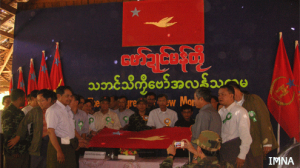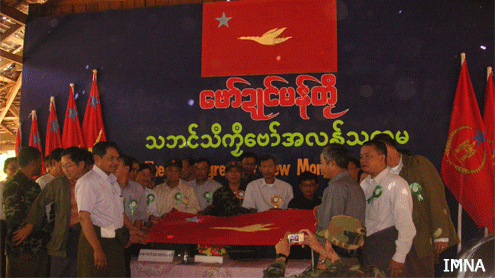
IMNA : The State Peace and Development Council (SPDC) has given the New Mon State Party (NMSP) a final deadline of September 1st to accept the SPDC’s Border Guard Force (BGF) offer.
A September 1st refusal by NMSP to transform its armed wing into a government-controlled BGF will, according to NMSP forces, mean the end of the ceasefire agreement reached in 1995 by the Burmese government and the NMSP.
The ultimatum was reportedly issued this week, when NMSP Central Executive Committee (CEC) members Nai Aung Min, Nai Tala Nyi, and five additional CEC members met with Southeast Command (SEC) Commander Maj. Gen. Thet Naing Win at SEC headquarters in Mon State’s Moulmein city on August 23rd.
“They [the Southeast Command] are forcing the NMSP to form a BGF, we reported to them about our BGF [decision] on April 22th. CEC members will decide about this, and we will send a message after we hold a meeting,” said foreign affairs vice-officer Nai Chay Mon.
According to party sources, the August 23rd meeting between the NMSP and Maj Gen. That Naing Win featured not only a discussion of the BGF proposal, but also a mandate from the SEC that the NMSP not interfere with the upcoming 2010 election developments in Mon State.
According to sources within the NMSP, SEC Lt-Gen Ye Myint originally wanted to meet with the NMSP’s chairman and vice-chairman on August 22nd about the BGF issue, but NMSP deferred the meeting.
“We were busy [preparing for] Mon Revolution day, that’s why we could meet with them [ the SEC] on August 23th. Lt-Gen Ye Myint had already left , so we just met with Thet Naing Win,” said foreign affairs officer Nai Handar Pon Khaing.
The 63rd annual celebration was held at a Blainjapan village in NMSP-controlled territory on August 25th of this year. The official Mon Revolution Day statement for this year featured a vow from the NMSP to never accept the Burmese government’s BGF offer.
The SPDC issued an earlier deadline for the NMSP’s acceptance of the BGF proposal in April of this year, claiming that a refusal would mean a return to a “pre-ceasefire relationship” between the two groups. The NMSP’s subsequent refusal led to a dramatic increase in tensions in southern Mon State. Several hundred villagers originally from NMSP-controlled territories in Tavoy District fled north to the Thai-Burma border to escape the threat of potential fighting; this threat was never realized, and the majority of the refugees returned to their homes.

